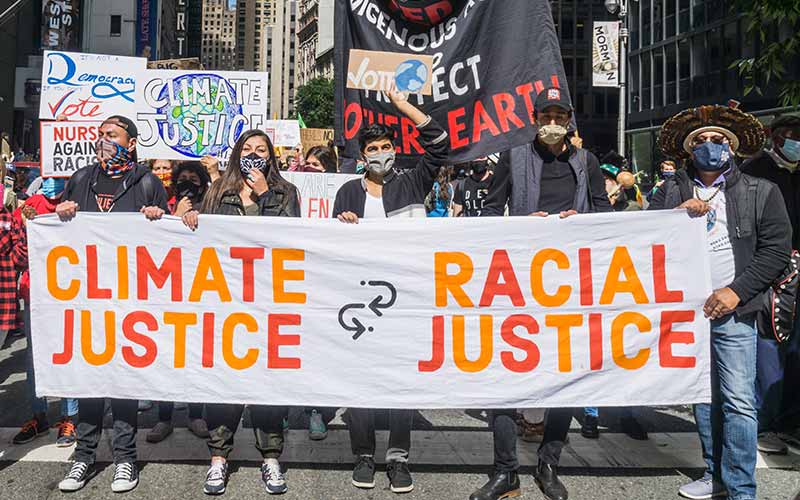
The predominantly Latino town near Denver facing the brunt of one energy company’s ignorance
Suncor Energy masqueraded its support for Black Lives Matter while also poisoning a community near one of its refineries.
In recent years, Colorado’s only major oil refinery, which is owned by the Canadian oil company, Suncor, has released illegally high levels of sulfur dioxide, hydrogen sulfide, hydrogen cyanide, nitrogen oxides, carbon monoxide, and particulate matter, according to state health authorities.
According to a new report by the Colorado Department of Public Health and Environment (CDPHE), Suncor has violated emission limits for these volatile organic compounds since 2017.
This includes an incident when a catalyst substance from the refinery rained on the neighboring community in the form of white ash, resulting in a record $9 million settlement.
CDPHE hired a third-party investigator to establish the root causes behind the failures. The firm concluded that there were no “deliberate or negligent actions” in funding or staffing that caused the incidents, but the report highlighted areas for improvement.
It was published on April 13, 2021 and Suncor is allegedly already implementing new initiatives, such as enhanced air monitoring and communication with the communities surrounding the refinery.
The company also promised to upgrade its automatic shutdown systems at a cost of $12 million, which they said will “significantly reduce the potential and severity of future catalyst releases.”
Despite these new initiatives and promises, major damage has been done, and Suncor has not truly been held accountable for it.
Lucy Molina, a resident of Commerce City, has instructed her teenage kids how to drive so that if there’s an emergency, they could transport her to the hospital. This is just one of the precautions that her family must take because they live within a mile of Suncor refinery.
Researchers have determined that particulate matter is one of the largest environmental causes of premature death in the U.S., and even thresholds currently deemed safe by the Environmental Protection Agency (EPA) still have the potential to be lethal.
The neighborhood of Adam Heights in Commerce City has a Latino population of about 73%, and the income of most residents is lower than the state average.
Ever since moving to the area seven years ago, Molina told VICE News that her children have experienced nosebleeds and headaches so severe that it’s sometimes difficult for them to make it to school. Molina herself has developed migraines and vertigo.
When she did seek medical help for these issues, a doctor told her that the refinery could be a factor, and suggested that she read a report by the Physicians for Social Responsibility.
The report said exposure to oil and gas infrastructure can “induce cancers, asthma, respiratory distress, rashes, heart problems and mental health problems.”
After reading CDPHE’s report, Molina began preparing her children for worst case scenarios. She explained that they may need to drive her to get medical help because often her dizziness can make it hard for her to get behind the wheel.
“These are the plans that we make,” Molina told VICE News. “When other communities are planning their summer, their vacation to Hawaii or Mexico, our kids are planning how to take care of their parents in case they get sick.”
Molina was one of more than 150 residents of the metro Denver region who participated in public hearings this month over whether a key air permit for the refinery should be renewed.
If the state health and environment officials deny the permit in the weeks or months ahead, it could possibly lead to a shutdown.
“@GovofCO & @CDPHE need to hear from those most impacted. We need to raise the bar on @Suncor until we can be assured that our safety and health are protected. Because if we can’t rely on our partner... then we need to dissolve the partnership.” - @CommerceNoble
— b buckley (@pupilindenial) April 28, 2021
The oil processing facility has exceeded pollution limits for hydrogen sulfide, carbon monoxide, and sulfur dioxide 15 times between March 27 and April 22 alone, according to a review of state data by the Denver Post.
If the permit is approved, the Commerce City refinery would continue operating adjacent to a zip code that has been determined to be the most polluted in the country, according to RealtyTrac.
According to the EPA, it’s also an area where 55% of the residents earn incomes below the poverty level, and 75% are people of color.
Those living in the predominantly Hispanic neighborhoods of Globeville and Elyria Swansea, which lie just south of the refinery, experience higher levels of asthma than other parts of Denver, according to a report from the Denver Department of Environmental Health.
“The children and youth of Globeville and Elyria Swansea visit emergency rooms for asthma-related treatment more often than their counterparts in Denver as a whole,” the report states.
During the summer of 2020, rather than focusing on the health and safety of these neighboring communities, Suncor decided to remain in good graces by portraying itself as a fighter for racial justice.
In the wake of the deaths of George Floyd, Ahmaud Arbery and Breonna Taylor, its president and CEO, Mark Little, published a statement in support of the Black Lives Matter movement.
Since then, Suncor reportedly had “three company-wide conversations about racism and discrimination.”
RELATED CONTENT
“We need to acknowledge racism because we cannot address what we are not willing to face,” Suncor’s manager of Inclusion & Diversity, Charlene Waugh, said in March.
Colorado activists, however, don’t buy the activism act, seeing as how the company pollutes a low-income community of color, directly contributing to environmental racism.
“What they need to face isn’t ‘racism’ in the abstract; it’s the real children who don’t have clean air to breathe because of Suncor,” said Kate Merlin, a climate and energy attorney with WildEarth Guardians.
Suncor wants to be a "friendly" Canadian company, and has announced it opposes racism. At the same time it is the largest polluter in the most heavily polluted zip code in the US, which is 75% non-white. Save the air. Shut it down.https://t.co/PHfi0fkKwX
— Kate Merlin (@wild_merlin) May 17, 2021
WildEarth Guardians is currently suing Colorado air and health authorities to enforce stricter limits on the refinery’s pollution.
Yet Suncor is aiming to pollute even more. It has requested permission from state air pollution control officials to increase the amount of hydrogen cyanide it is allowed to release each year from 12.8 tons to 19.9 tons.
Exposure to this byproduct of processing crude oil can cause headaches, nausea, weakness, dizziness, and at high-enough levels, it can lead to death.
Despite this, Suncor told VICE News that the Commerce City refinery is getting safer all the time, citing that new improvements continue to be made.
“We’ve installed automatic shutdown systems to prevent releases, a pipeline that has reduced the number of trucks accessing the refinery by 150 trucks each day, and we’ve added equipment to improve the quality of our fuels and reduce their environmental impacts,” a spokesperson said.
But community members are far from reassured that the company is being transparent or that public health will improve.
“Suncor is a poster child facility for environmental racism and the kind of mega-polluter that should have been dismantled and cleaned up years ago." – Kate Merlin, WildEarth Guardians
— WildEarth Guardians (@wildearthguard) May 3, 2021
Help us #ShutDownSuncor: https://t.co/eLCynEcCA5https://t.co/DDP9aNLfDN
In 2019, when an operational problem at the refinery caused a yellow clay-like ash to start raining down on the nearby community, two schools had to go into lockdown.
“My child was in that school,” Molina said. “We were freaked out.”
Darci Martinez spoke to VICE News about her experience working as a nurse practitioner at a school not far from the refinery last summer. On the way to work, she had to roll her car windows up to prevent foul-smelling air from coming in.
Suncor incident causes white ash material to fall from the sky in Commerce City https://t.co/uZvQraJHqd pic.twitter.com/JxSY1GEyek
— Channel 2 KWGN (@channel2kwgn) December 12, 2019
Many of the students at the school have asthma, and also came from Latino areas hit disproportionately hard by the coronavirus. This might not be a coincidence, as Harvard researchers did find a link between exposure to air pollution and COVID-19 mortality.
Martinez also said that catastrophic wildfires hit the state around this time, filling the area with a dangerous smoky haze.
Suncor said that it scaled back operations during this period, but Martinez said it didn’t make a difference. In her opinion, the only option that would have sufficed is a complete closure.
“Suncor couldn’t even shut down the stacks for two days to allow us to breathe,” Martinez said.











LEAVE A COMMENT:
Join the discussion! Leave a comment.